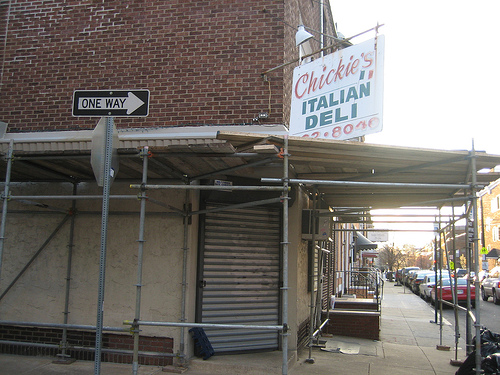Planted firmly at the corner of 10th and Federal St. in the Bella Vista neighborhood of South Philadelphia, Chickie’s has been loading up hoagies for peckish customers since 1993. Now, after nearly twenty years, Chickie’s is available for purchase. But while Chickie’s may be a tempting piece of commercial real estate, the buyer may want to consider enforcing a non-compete agreement with its seller before moving in.

Business for Sale, or Location for Sale?
Right now, there’s a sign hanging outside of Chickie’s. The sign announces to all who pass by: “Rare opportunity to purchase a long established business with high quality reputation since 1993 including all good will, business and equipment plus a bi-level 2 bedroom, 2 bath residence, all located in the Italian Market area!” The asking price is currently set at three quarters of a million dollars.
Between the language of the sign and the existence of a price tag, the logical conclusion would be that Chickie’s is available for new commercial tenants. The deli is for sale — but there’s a catch for would-be buyers.
Background
Chickie’s is owned by entrepreneur Henry George. George isn’t exactly pleased about the sale, saying that a divorce has forced circumstances. It wasn’t George’s choice to close up shop, and he doesn’t intend to be edged out of the sandwich business. He tells Philly.com that he’s planning on setting up a “bigger” and “better” reincarnation of Chickie’s, just blocks away from the original location. The new establishment — also to be called Chickie’s — will even feature the same old menu and kitchen staff that patrons have come to know and love.

Why a Non-Compete?
Any asking price for the purchase of a “business” that is more than the value of the equipment is assuming some component of a valuable intangible, also called “goodwill.” Admittedly, an aspect of goodwill for a retail business like a deli includes a great location, but another is the brand name recognition. Even if the rights to the name “Chickie’s” is included in the purchase, a buyer would no doubt be dismayed if the well-known longtime owner were to open up a deli in close proximity to the “business” that he or she just paid big money for. Anyone looking to purchase the original Chickie’s, and all of the goodwill associated therewith, would be wise to consider insisting the seller sign a non-compete agreement in connection with the sale.
A non-compete agreement, otherwise known as a restrictive covenant, is a type of business contract intended to expressly prohibit commercial competition between parties. Non-competes are especially critical in situations where similar businesses would have a close geographical proximity, and in turn, a heightened degree of competition.
When a buyer insists that a seller submits to a non-compete agreement, the intent is to prohibit the seller from starting another business that would compete with the buyer’s company. In this case, the buyer of Chickie’s would benefit commercially from requesting that Henry George comply with a non-compete, as George intends to remain an active competitor nearby.
If the new buyer of Chickie’s were to enact a non-compete agreement with Henry George, George would be unable to open a new Chickie’s in the same neighborhood, as he currently plans on doing.
Requesting a non-compete during the purchase of a business isn’t unique to situations where the prior owner openly states a desire to stay in the same industry and neighborhood. Simply put, it is always commercially prudent to request a non-compete.
While the specific terms of non-compete agreements between business sellers and purchasers vary on a case-by-case basis, they typically demarcate a physical area or industry in which the prior owner is legally prohibited from operating. It can be applied to any industry or business model as protection for the purchaser.

What Does a Non-Compete Cover?
Like other business contracts, non-compete agreements tend to vary from case to case in their language and the precise details therein. However, there are some basic points which most non-compete agreements cover.
- Geography. Non-competes may set limitations on the physical geographies in which businesses are permitted to operate. For example, a certain neighborhood or square mileage may be deemed off-limits. If a business operates on a strictly digital basis and owns no brick-and-mortar facilities, the geography factor becomes a grey area and may be difficult to enforce.
- Time. Non-competes may predetermine a set period of time during which would-be competitors are barred from operating. As with geography, time restrictions must be of a sufficiently reasonable nature, or else enforcing them in court can become challenging if not impossible.
- Industry. Finally, non-competes may set limitations on the industry in which a business seller may continue working. If these restrictions are too broad, the non-compete may overstep the bounds of what is considered enforceable.
If your company needs the assistance of an experienced Pennsylvania business transaction attorney when it comes to commercial transactions or the drafting and enforcement of non-compete agreements, contact the law offices of Maselli Warren online, or call us at (800) 891-2657 for a free and confidential consultation.
